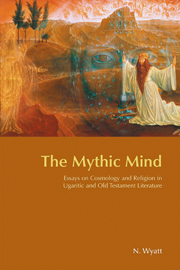Book contents
- Frontmatter
- Contents
- Preface
- Acknowledgments
- Abbreviations
- Chapter 1 THE PROBLEM OF THE ‘GOD OF THE FATHERS’
- Chapter 2 THE DEVELOPMENT OF THE TRADITION IN EXODUS 3
- Chapter 3 THE SIGNIFICANCE OF THE BURNING BUSH
- Chapter 4 WHO KILLED THE DRAGON?
- Chapter 5 SEA AND DESERT: SYMBOLIC GEOGRAPHY IN WEST SEMITIC RELIGIOUS THOUGHT
- Chapter 6 SYMBOLS OF EXILE
- Chapter 7 OF CALVES AND KINGS: THE CANAANITE DIMENSION IN THE RELIGION OF ISRAEL
- Chapter 8 THE DARKNESS OF GENESIS 1.2
- Chapter 9 THE SIGNIFICANCE OF SPN IN WEST SEMITIC THOUGHT: A CONTRIBUTION TO THE HISTORY OF A MYTHOLOGICAL MOTIF
- Chapter 10 THE VOCABULARY AND NEUROLOGY OF ORIENTATION: THE UGARITIC AND HEBREW EVIDENCE
- Chapter 11 THE MYTHIC MIND
- Chapter 12 ‘WATER, WATER EVERYWHERE…’: MUSINGS ON THE AQUEOUS MYTHS OF THE NEAR EAST
- Chapter 13 ANDROGYNY IN THE LEVANTINE WORLD
- Bibliography
- Index of References
- Index of Names and Places
Chapter 3 - THE SIGNIFICANCE OF THE BURNING BUSH
- Frontmatter
- Contents
- Preface
- Acknowledgments
- Abbreviations
- Chapter 1 THE PROBLEM OF THE ‘GOD OF THE FATHERS’
- Chapter 2 THE DEVELOPMENT OF THE TRADITION IN EXODUS 3
- Chapter 3 THE SIGNIFICANCE OF THE BURNING BUSH
- Chapter 4 WHO KILLED THE DRAGON?
- Chapter 5 SEA AND DESERT: SYMBOLIC GEOGRAPHY IN WEST SEMITIC RELIGIOUS THOUGHT
- Chapter 6 SYMBOLS OF EXILE
- Chapter 7 OF CALVES AND KINGS: THE CANAANITE DIMENSION IN THE RELIGION OF ISRAEL
- Chapter 8 THE DARKNESS OF GENESIS 1.2
- Chapter 9 THE SIGNIFICANCE OF SPN IN WEST SEMITIC THOUGHT: A CONTRIBUTION TO THE HISTORY OF A MYTHOLOGICAL MOTIF
- Chapter 10 THE VOCABULARY AND NEUROLOGY OF ORIENTATION: THE UGARITIC AND HEBREW EVIDENCE
- Chapter 11 THE MYTHIC MIND
- Chapter 12 ‘WATER, WATER EVERYWHERE…’: MUSINGS ON THE AQUEOUS MYTHS OF THE NEAR EAST
- Chapter 13 ANDROGYNY IN THE LEVANTINE WORLD
- Bibliography
- Index of References
- Index of Names and Places
Summary
The meaning given to a story when it is handed down over successive generations, in written or oral form, will often change imperceptibly. This is particularly true of stories which have a specifically ideological or religious content, for it is then in the interest of the preserving community to continue to relate the story, if it is believed to have continuing value, to their circumstances and developing understanding of themselves. A direct result of such a process is often the loss of the original meaning. It seems to me that the original significance of the curious episode of the burning bush in Exodus 3 has been lost in this way.
The recovery of an original meaning will to a large extent depend on our ability to recover the original circumstances in which the story took shape, and indeed to ascertain precisely the literary type to which the story belongs. So long as the present story is regarded as being rooted, however obscurely, in the history of the pre-settlement era, then its true meaning, both theologically and in the history of religious thought, can only remain hidden. In this brief discussion I shall suggest a different historical context from the one normally accepted, in order to obtain a better understanding of the story.
- Type
- Chapter
- Information
- The Mythic MindEssays on Cosmology and Religion in Ugaritic and Old Testament Literature, pp. 13 - 17Publisher: Acumen PublishingPrint publication year: 2005

